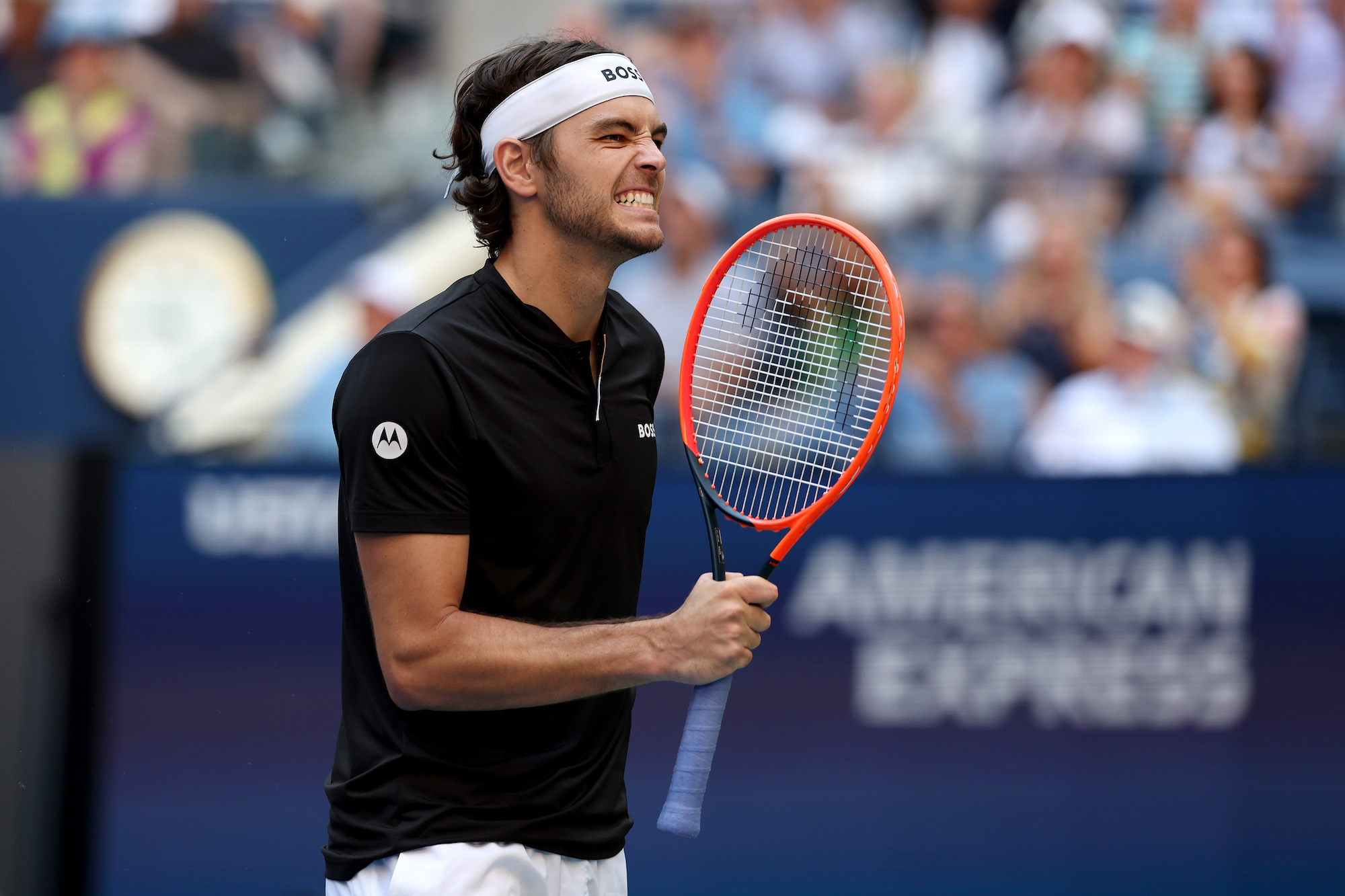Taylor Fritz, who for years has been a top-10 fixture and the leading American in men’s tennis, hasn’t had the major tournament results to match.
On the surface, it’s a little odd. The 26-year-old might be the best ball-striker of his American cohort, and he’s physically transformed himself into a competent mover, after starting his career as a tottering presence with feet that seemed to fly out from underneath him without warning.

While Tommy Paul, Ben Shelton, and Frances Tiafoe have each reached a major semifinal, Fritz had stalled out four times in the quarters.
“I think the mental coping that I was doing for it was, Well, every time I was in the quarters, I played [Novak] Djokovic,” Fritz said, laughing after finally accomplishing the feat Tuesday with a 7-6(2), 3-6, 6-4, 7-6(3) win over Alexander Zverev. “I think that was my way to just protect my ego.” After two losses to Djokovic and one to Rafael Nadal, Fritz was outplayed in his Wimbledon quarterfinal this past July by a mortal Lorenzo Musetti in five sets. “I think that’s when I was, like, OK, maybe I can’t, that excuse doesn’t quite work out anymore,” he said.
The focused and big-serving Fritz has cruised through this year’s U.S. Open draw, facing little resistance until yesterday. For the second major in a row, he dispatched Zverev, a higher-ranked and broadly higher-achieving player. At the Open, Fritz is the No. 12 seed to Zverev’s No. 4. For large stretches their quarterfinal matchup was “tight tennis,” defined by the relative quality of serving. Neither player had much success attacking from the baseline, as Fritz explained in the post-match press. He managed to stay slightly more assertive despite the circumstances. Zverev’s serve faded after a high-level first set, and he was let down by his two-handed backhand, which he often duffed into the net and missed long by six feet.
“My most reliable shot, the shot that I’m most known for, the shot that you normally wake me up at 3 a.m. and I would not miss, was absolutely not there today, and I have no words for it, to be honest,” Zverev said in press, saying it was the most frustrated and angry he’d been after a match in a long time. A semifinalist at the Australian Open and a finalist at Roland-Garros, Zverev leaves the last major of 2024 still empty-handed.
There was a faint whiff of animosity in the air. The last time these two played, in the fourth round at Wimbledon, Fritz’s influencer girlfriend Morgan Riddle celebrated with an Instagram story she later deleted, captioned “when ur man wins 4 the girls,” obliquely referencing allegations of domestic violence by Zverev. At the post-match handshake, Zverev appeared to chide Fritz at the net for the behavior of his box. “I think there’s some other people that maybe are in the box that are not maybe from the tennis world, that are not maybe from particularly watching every single match. They were a bit over the top,” Zverev said at the time.
The public’s awareness of Fritz, given his lack of Slam success, is somewhat surprising. Perhaps it can be attributed to his prominence in the Netflix tennis docuseries that tracked his career-best win, a 2022 Indian Wells title won in his native southern California, on a badly tweaked ankle that made him consider withdrawing from the final against an also-injured Nadal. Credit for Fritz’s popularity also goes to Riddle, a popular TikTok presence who might have done more to spread awareness of tennis to people under 30 than most professional American tennis players under 30. Fritz is an affable, dry presence. He committed to tennis late, after going to a normal high school and playing a variety of sports, while his peers were already grinding full-time in strange siloed-off environments. He had a court in his backyard; a dad, Guy Fritz, who played professionally; and a mom, Kathy May, who made it to the top 10 during her career. (Since Emma Navarro and Jessica Pegula’s successes at this U.S. Open have raised the profile of billionaires in this sport, let it be known that Fritz is the great-great-grandson of the man who founded the department store that eventually merged with Macy’s.) In his years on tour, Fritz has made the physical gains to do justice to his immense technical gifts.
Friday’s semifinal will pit Fritz against his longtime friend Frances Tiafoe. It’s the first major semifinal between two American men since 2005, and it will produce the first American men’s major finalist since Andy Roddick at Wimbledon in 2009. Tiafoe took the opportunity Tuesday night to joke about their differences. “When I first met him, Taylor was, I mean—he was an odd cat, different cat,” he said. “I mean, I definitely wasn’t thinking he was going to do what he’s done. He’s changed his body unbelievable.” Tiafoe said they couldn’t be more different as personalities—”he’s [a] video-game, never-leave-the-room goofball … I’m loud and obnoxious at times”—but had pushed one another in their careers.
Tiafoe recalled a moment when the two of them were on a plane, and Fritz piped up to say they would become the two top-ranked American men. “Coming from him, I was like, ‘Dang, dude, 6:00 a.m., I’m pretty tired, but let’s do it. Why not?'” Tiafoe said. “He’s kind of had that mindset and he’s pushed me a lot, you know what I mean?”
When asked about Fritz’s 6-1 lead in their head-to-head matchup, Tiafoe, who loves a good show, seemed secure that the different environment this time around would play in his favor. “Playing quarters of Acapulco 500, and playing semis at Arthur Ashe at night—well, hopefully at night—it’s a little different,” he said. Fritz is looking a little different, too. By a large margin, this is the sharpest he’s ever played at a tournament this big.









